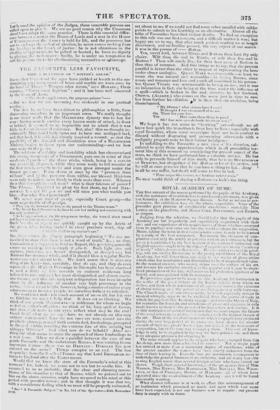ROYAL ACADEMY OF MUSIC.
THE first concert of the season performed by the pupils of the Academy, with the assistance of established and experienced periMmers, was given last Saturday, at the Hanover Square Rooms. As t'ar as relates to per- %mance, the exhibition was, on the whole, reSpeCiable. Siallii of the juveniles gave promise of considerable excellence ; especially Miss LODER 011 the pianoforte, and 3lisses COLE, DAVENPORT, and RISD031, as singers.
Judging from the selection, we shonld hirer that the pupils of this Academy are but imperfectly and superficially acquainted with their art ; and our experience of the acquirements of those w ho have emerged from its pupilage and come out itimul the WO rid confirms the supposition. Music, taking the term in its comprehensive sense. is only to be learned by a study of the best composers. Not merely the elements of com- position—not only the ability to perenen weil on an i:•struntent, but the art as it is exhibited by the be-t 'misters ot the various Continental and English schools—ouela to be the object is any •• academy of music " which dcscrccs that name. Ile w s to excel in paint- ing, Will not coellue his st Utiles to the seien■ exi,i1 Ilion:: of tisiee aRrotiystsal Academy, lmt will direct thou ,N,.riss of .1110 Which time has ascertained and determines! to be unquestioned value. So the musical student, who mere l3 shims os sr the surface of his art, and devotes his exclusive attcntiou to the popular and it may be short- lived productions of the day. will enter on his professiou ignorant of its history and unacquainted with its ressmrees. No provision :ippears to be made in this Academy for instruction in the works of the :,.!;;at fathers of the Italian school, from whom we derive, and from musicians of :di 11.L5 derIVCd. the elements of choral cccii lug-u. the pow er sa' col:Willi:1g insPi .y with harmony. The Church musis o!' our OW II country. in Iv:,i;11 espeeially resides its nmsical strength, apre..rs to 1,e excluded front the course of study in I winch die piic is of this Aeatlemy eugag-e : and eveu the Opera of Italy, for centuries the fouptain and storehouse of graco and ehyanee. is only made known to them i:t the peit.,ti of its degcn:raey and decline. It is It) this destitutioe oh' 'nosiest instruction that we must impute the failure of the establishment, it all l• cc:elected w Eh the highest branch of I e art. Most of the vocal compoenions 55 hIked i 1 lp ii have produced during' the now loug Frio I 01 its ex.:et...lee. have shown due slender amount of their coiaposeto. loao. eelgee not in d. oS the rudiments of
composition, but of the true way employ them. This sort of know- ledge is only to he' acquired in the e.ey we leave pointed out. and there is no adequate provision for obtairing it.
The saute remark applies to th.. singers who have emerged from this Academy, BOW more than a hued:eel. in Bain her. Not a single pupil has arrived at more tl an a secondary degree of excellence, while of the greater number tl havc ht.'ea Utterly unknou n front the time of their leaving it. Es en the best are notoriously incompetent to undertake the general business of an orchestre, and are really less able to sing English ninsie than several tbreign artists so Ito have visited our shores. Weigh their general know lekh.:e of the art against that of Miss MASSON, Miss HAAN FS. Mks AINFORTII. Miss NOVELLA). Miss WOOD.
YATT, or that of Pit i testis, Menne. or llswel55--Sii WhOill have appeared since the esetb;ishment of the Academy—and it will be found lamentably wanting.
What sinister influence is at work to effect this mismanagement of an institution which promised so much. and upon which vast sums have been expended. is net our business now to inquire: our present duty is simply with its fruits.


























 Previous page
Previous page